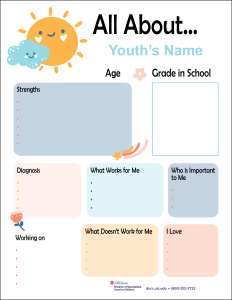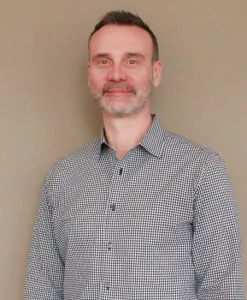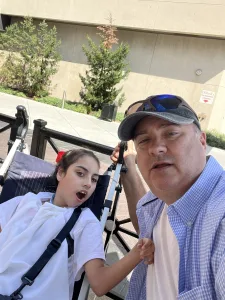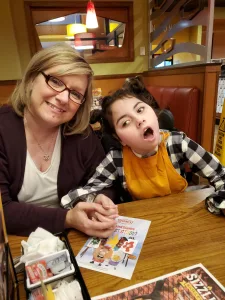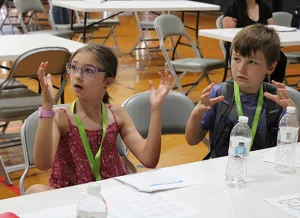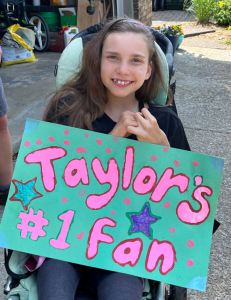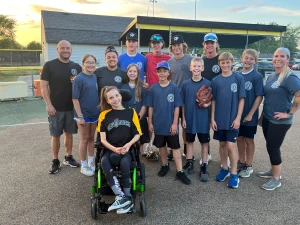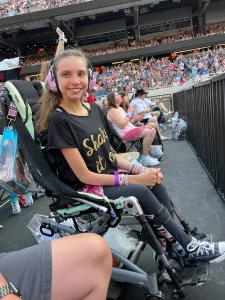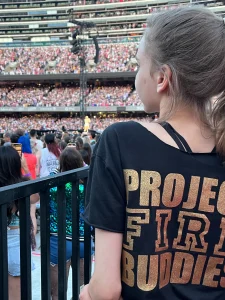Introducing “All About Me” Pages to Highlight Your Child’s Strengths, Needs and More

We’ve created free templates you can personalize to help doctors, schools and others get to know your child
It takes a village to care for children and youth with special healthcare needs. Parents and caregivers must partner with many different team members — specialists, nurses, therapists, educators and so on — to help their children reach their full potential.
Ensuring everyone understands your child and their unique needs can be exhausting. We want to help make it easier to share your child’s strengths, wants, goals and more.
We’ve created “All About Me” Pages that you can personalize to help anyone get to know your child. These free templates highlight what works best for your child, what they like and dislike and who they are as a person.
There are a variety of designs to choose from to help you capture your child’s personality and what makes them unique.
Visit the new “All About Me” Pages section of our website to see the templates and learn how to customize them for your child.
Our “All About Me” Page templates are available for anyone to download and customize.
If you are a Division of Specialized Care for Children (DSCC) participant and need help using the templates, please contact your Care Coordinator.
These pages are a result of feedback from our annual family surveys and our Family Advisory Council meetings.
We hope these pages can be helpful conversation starters with new doctors, nurses, teachers and other caregivers for your child.
Home Care Region 2 Care Coordinator Earns DSCC’s Award of Merit
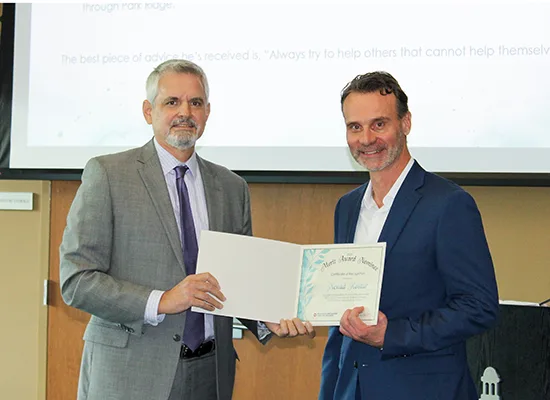
DSCC honors Ned Kostur for outstanding service to Illinois children and youth with special healthcare needs and their families
Care Coordinator Ned Kostur is the 2023 recipient of the University of Illinois Chicago’s Division of Specialized Care for Children (DSCC) Merit Award.
The award recognizes exceptional employees for outstanding dedication and service to Illinois children and youth with special healthcare needs.
“Ned is an outstanding Care Coordinator. He is a trusted mentor to his teammates and a caring and dedicated partner to the families he serves, helping meet their needs and improve the quality of their lives,” DSCC Executive Director Thomas F. Jerkovitz said.
Ned is based in our Lombard Regional Office and works for DSCC’s Home Care Region 2. As a Care Coordinator in the Home Care Program, he helps families of children and youth who need in-home nursing to safely live at home.
Many of the DSCC participants Ned works with are on the Home and Community-Based Services Waiver for Those Who are Medically Fragile Technology Dependent (commonly called the MFTD waiver). These children and youth have more complex medical needs that require a higher level of care.
Ned helps educate their families about the services and benefits of the MFTD waiver and other state programs that can help meet their needs. He also guides families through the process of modifying their homes to support their child’s medical care and equipment.
“I meet with families, which I enjoy very much. It’s just a rewarding experience to get a piece of equipment or to finally find that right nursing fit for that family and just to see the smile on the family’s face as we’re aiding them in their journey in helping their child,” Ned said. “It’s just a great organization to work for.”
Ned began his journey with DSCC in 2003. Over the last two decades, he has worked in both the Core and Home Care programs.
Ned is a “go-to” for his colleagues who describe him as caring, compassionate, considerate, and hard-working. They also love how his passion for serving our participant families shines through in all his actions.
“Ned exemplifies what great care coordination looks like and its positive impact on the families we serve,” said Terri-lynn Jones Wood, Assistant Director of Home Care Operations for Regions 2, 4 and 6.
“He has a true desire to bring families a sense of relief and understanding that they have someone on their side, someone they can trust and rely on,” Home Care Region 2 Regional Manager Mariangely Spilotro-Marquez added.
“He takes great pride in his work and ensuring that families understand Home Care, the services provided, what his role is and how he can assist them.”
Ned draws on his experience in clinical psychology, biology, treatment and discharge planning, quality assurance, teaching and more to help others. His Lombard teammates appreciate his wealth of knowledge about DSCC processes and resources, sense of humor and willingness to help in any situation.
“He has shown me what it means to be dedicated, empathetic and professional,” Program Coordinator Assistant Kimberley Firkins said. “Ned’s the perfect example of what it means to partner, help, and connect, not only with our families and providers but also within the organization, with his teams, and his co-workers.”
Learn more about Ned and his exceptional service to families in this video below:
DSCC staff nominated a total of five of their colleagues for this year’s Merit Award. As the winner, Ned receives a Merit Award memento, a $2,500 award and recognition from the Executive Director.
The other 2023 nominees are:
- Elizabeth “Liz” Bailey, Home Care Enrollment Manager, Lombard Regional Office
- Lisa Garbe, Assistant Regional Manager. Marion and Olney Regional Offices
- Mayra Rubio, Bilingual Care Coordinator, Mokena Regional Office
- Amanda Simhauser, Communications Manager, Central Administrative Office in Springfield
A big congratulations to Ned and all the 2023 nominees! We are grateful for your service and commitment to Illinois families!
DSCC Partners in Research Study to Improve Home Health Care for Children
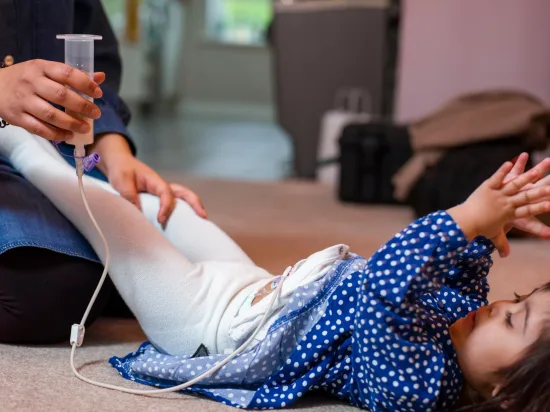
“SafeCare@Home4Kids” aims to understand and prevent safety issues at home for children with medical complexity
The Division of Specialized Care for Children (DSCC) is excited to partner on a new research study to help improve home health care for children with complex medical needs.
The research team is led by Dr. Carolyn Foster of Ann and Robert H. Lurie Children’s Hospital of Chicago. Foster is one of our Medical Advisory Board Members.
Foster and her research team have received a $2 million grant award to fund the study, called “The SafeCare@Home4Kids Learning Lab: Designing Safer Healthcare at Home for Children.”
This study will bring together experts and patient families to better understand how family caregivers and home nurses can help identify, communicate and prevent safety issues at home for children with complex medical needs. The study will use this input to create a digital safety toolkit to help support families.
DSCC Executive Director Thomas F. Jerkovitz said DSCC appreciates this opportunity to partner in the study. He said DSCC will share our team’s experiences with families and home nurses who report safety challenges at home.
Dr. Molly Hofmann, our Director of Care Coordination, Systems Development and Education, is one of the participating experts.
“DSCC plays such a pivotal role in supporting care in the home and… is a repository for safety events,” Foster said. “DSCC also plays such a functional role in creating solutions, so it was pretty clear to me I wanted to have DSCC be a partner in the grant.”
Children with medical complexity need substantial amounts of care to live safely at home. In recent years, their families have taken on increasingly more in-depth medical care at home.
“We send patients home with increasingly more complex medical regimes, and families have expressed to us they didn’t have a clear way to get the support they need when experiencing problems at home,” Foster said.
“A lot of our patients have an artificial airway to help them breathe or they have a g-tube in their stomach to help them eat. If that gets clogged or it falls out or the tubing connected to the machine gets broken, then they can’t get the nutrition they need and they end up in the emergency room. And it’s a life-threatening event at home if their airway isn’t working,” Foster continued. “The idea for the study is we want to find out what are the things leading up to when those safety events occur so we can prevent them.”
“SafeCare@Home4Kids” also wants to help improve communication when medical device and equipment malfunctions happen at home.
“Doctors don’t always know, and families might not know that they should or can tell us about it. They might tell the DME (durable medical equipment company) to get the replacement part, but we don’t know about it, so we keep ordering it for other patients,” Foster said. “It’s both an issue for current patients and also an issue for future patients.”
The study aims to create a better system where families can communicate safety problems at home and know who to notify when they occur.
“One of the problems we recognize is families are scared they’re going to get in trouble. We want to make sure they feel supported to let us know when medical problems are happening at home,” Foster said. “The goal is to move past the reporting safety events to preventing them in the first place.”
The study will also host focus groups to hear directly from families about the safety issues that affect them.
“The goal is to hear from real families on what it’s like day-to-day,” Foster said. “Hopefully it’s the beginning of several projects to support how we’re improving care in the home.”
If you are a family member and would like to participate or learn more about the “SafeCAre@Home4Kids” study, you can email Foster at fosterlab@luriechildrens.org.
We are excited to collaborate with Foster and her research partners on this important project. We’ll share more updates and opportunities to get involved as it progresses.
The project kicked off in September and will continue through July 31, 2027.
Sensory-Friendly Holiday Happenings in Illinois
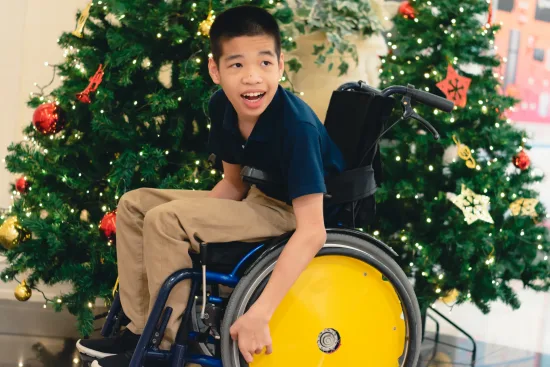
Fun, inclusive events the whole family can enjoy throughout Illinois!
How will you make memories this holiday season?
There are light displays, sensitive Santa opportunities, parades and more going on throughout Illinois.
Our Special Events page includes a roundup of opportunities designed specifically for youth with disabilities and special healthcare needs.
You can also browse this collection of special programs and event guides for opportunities to create some holiday magic and plenty of smiles:
- Autism Speaks and Cherry Hill Programs will provide sensory-friendly Santa experiences in Illinois and the St. Louis area on Dec. 3. These visits are free. Keepsake photo packages will be available for purchase. You must sign up to attend. Visit the Santa Cares website for a complete list of Santa’s stops. Be sure to select “Santa Cares”, “Caring Santa” or “Sensitive Santa” when checking your location. (Note some event dates and times may vary. Please check your location to confirm your date and time.)
- The National Federation of the Blind is offering letters from Santa and winter celebration letters in Braille to children who are blind or have low vision. The program is for children ages 10 and younger. Please complete the letter request form before Dec. 15. If you have any questions, call (410) 659-9314, ext. 2236, or email education@nfb.org.
- The Secret Sleigh Project is coordinating volunteers to provide in-home Santa visits to children who are medically fragile. Use the “Request a Santa Visit” form on the project’s website to request a visit.
- For families in the southern Illinois area, SI Families’ event calendar provides a great list of fun, seasonal activities. Other events in the area include Sensitive Santa at Heartland Regional Medical Center in Marion, the Carbondale Lights Fantastic Parade, and the DuQuoin Holiday Lights Fair.
- For options in central Illinois, check out these lists from ChambanaMoms.com and Springfieldmoms.org. Great places to see lights include Chatham Lights up the Park, Festival of Lights in East Peoria, and Mattoon Lightworks.
- For Chicagoland residents, WTTW Public Television, Chicago Parent Magazine and Kidlist have some great suggestions for things to do and see. Want to catch a show? Chicago Children’s Theatre features accessible weekends for children and their families.
- Don’t forget to check with your local zoos! The St. Louis Zoo and Lincoln Park Zoo will offer a sensory-friendly viewing option. Contact your local zoo to see what’s happening and when.
We will continue to add holiday events and activities, so please check our Special Events page often throughout the season.
If you know of a good sensory-friendly event to share, please email us at dscc@uic.edu.
Please note, the University of Illinois Chicago’s Division of Specialized Care for Children (DSCC) is not involved in organizing or scheduling these holiday events. If you have questions about a specific event, please contact the event sponsor or organizer.
DSCC Rolls Out New Tool to Better Connect With Our Participant Families
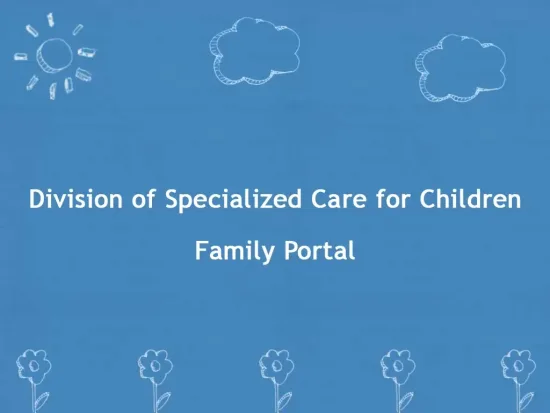
The DSCC Family Portal can help you easily communicate with your care coordination team and find the information you need
It’s important for our Division of Specialized Care for Children (DSCC) participant families to be active partners in their child’s care. We’re excited to introduce a new way for you to easily share information and communicate with your DSCC care coordination team.
Our new DSCC Family Portal aims to help you find the records you need all in one convenient place.
You can use the Family Portal to:
- Send messages
- Sign documents
- View important letters
- See a list of providers and much more
To access the portal, visit https://go.uic.edu/DSCCFamilyPortal.
To log in to the Family Portal for the first time, you will need:
- Your email address
- Your DSCC participant’s name or DSCC ID number
- A unique password
We know learning a new application can seem tough. We have tip sheets and videos to help you get started and feel comfortable using the portal. You can find these resources on our website at https://dscc.uic.edu/dscc-family-portal/.
If you have trouble accessing the Family Portal or need other support, please email dsccexternalhelp@uic.edu. A designated DSCC staff person will help you as soon as possible.
We are always looking for ways to improve our services and strengthen our support for families.
We hope the Family Portal will be an easy and convenient way for you to connect with your care coordination team and the resources you need.
DSCC Dad Helps Superheroes of All Abilities Unite in Southern Illinois
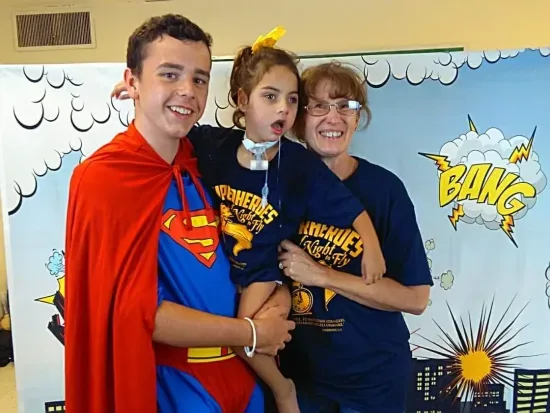
Pastor Tim Reynolds organizes the annual Special Needs Superheroes event to take place in Mount Vernon on Oct. 28
In Mount Vernon, superheroes of all kinds unite each year to bring joy to children and adults with disabilities.
Mount Vernon Baptist Temple’s annual Special Needs Superheroes event encourages individuals of all ages and abilities to dress as their favorite superhero and enjoy fall activities together. This popular free celebration returns for its fifth year on Oct. 28.
Pastor Tim Reynolds helped create the event and credits his wife, Melissa, and a dedicated group of volunteers with keeping it running. Reynolds’ daughter Isabella has complex medical needs and is a participant with the University of Illinois Chicago’s Division of Specialized Care for Children (DSCC).
Reynolds said the idea for the event came from a desire to serve his small community in southern Illinois.
“It can be hard for families and individuals with disabilities to go to a theme park. We have a church with a good layout, nice grounds, and a gymnasium,” Reynolds said. “I pastor two churches, and we decided to work together to create a special day for young and old alike that was as close to a carnival atmosphere as possible.”
Choosing a superheroes theme, the first event kicked off in 2018.
“I’m not sure why we chose the superheroes theme, but it fit, and it’s lots of fun. The first year we had about 400 attendees,” Reynolds said.
The event continued to grow each year except for a one-year gap in 2020 due to the COVID-19 pandemic.
“This year we’re planning for more than 800 guests. We have a bunch of folks who love Comic-Con. They have amazing costumes and travel from Missouri, Kentucky, Indiana and other places to help us year after year,” Reynolds said.
Volunteers from churches, 4-H clubs, government, and more serve as “buddies.” They help participants of all ages and abilities experience activities that include:
- A petting zoo and horseback rides
- Face painting and games
- Balloon tying with Rainbow the Clown
- Superhero photos
- Haircuts
- Brats, hamburgers, snow cones and popcorn
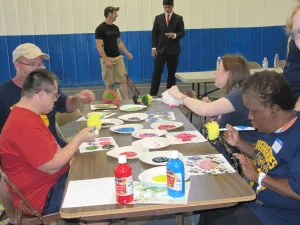
“It’s just a big kick. Some people like dressing up, others just like taking it all in,” Reynolds said. “I really love the horseback riding and seeing them with the animals. For some, it’s the first time they’ve ever ridden a horse or been able to touch and be up close to these animals. They’re so uninhibited in expressing their excitement and joy. You can’t help smiling all over.”
The guest list also includes community members and residents from area Community Integrated Living Arrangement (CILA) Homes.
The whole Reynolds family, including Isabella and her three older siblings, also take part in the fun.
Reynolds said his wife, Melissa, organizes all the details for the superheroes event. She prefers to remain in the background while he is “just the promoter and front man.”
“She is the rock of our family and works tirelessly caring for Isabella,” Reynolds said.
Isabella has Moebius syndrome, a rare neurological disorder that can cause paralysis, an inability to smile and other disabilities.
“We adopted her as a baby and the doctor said she wouldn’t live past a year old,” Reynolds said. “She’s a happy girl and recently turned 12.”
Isabella enrolled with DSCC shortly after birth and receives services through the Home Care Program. The Home Care Program helps children and young adults who need in-home nursing to safely live at home.
“We connected with DSCC at the hospital and really appreciate all that they do,” Reynolds said. “DSCC has helped us track down nursing services and medical equipment. They’re always there to help and are another go-to when you need help filling in the gaps.”
Members of our DSCC team from the St. Clair Regional Office will be at this year’s Special Needs Superheroes event to speak with families about our services.
The event takes place from 4 to 6:30 p.m. on Oct. 28 at Mount Vernon Baptist Temple, 817 Woodland Drive, in Mount Vernon. There is no charge to attend.
“Everything is completely free,” Reynolds emphasized. “There’s nothing better than the smiles and hugs you get from kids with sno-cone-covered faces. We started all of this to be a blessing to someone, but I think we, the volunteers, are truly the ones who go away blessed.”
See the Special Needs Superheroes flyer for more details or visit the Events section of our website.
If you’d like to attend, please call or text (618) 315-1111 to register. The deadline to sign up is Oct. 23.
Institute Provides Education, Support and Connection for Families of Children with Hearing Loss
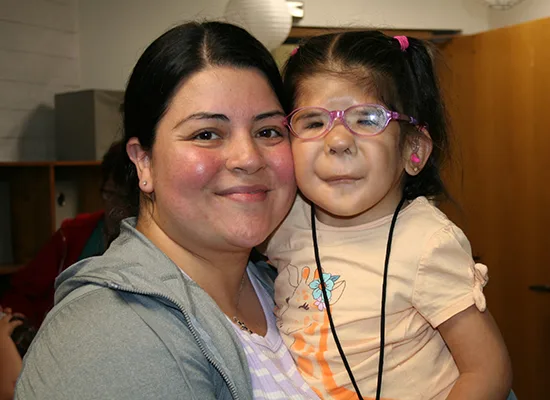
Illinois families gained knowledge and formed priceless relationships during the 2023 Institute for Parents of Preschool Children Who Are Deaf or Hard of Hearing.
The journey to the 2023 Institute for Parents of Preschool Children Who Are Deaf or Hard of Hearing was a mixture of excitement, nerves and some fear for Kelly Lane and Crystal Harris.
When they received the flyer for the free one-week program at the Illinois School for the Deaf in Jacksonville, they were skeptical it would be the right fit for their son, Casper.
Casper, 4, has bilateral hearing loss, epilepsy and a developmental delay.
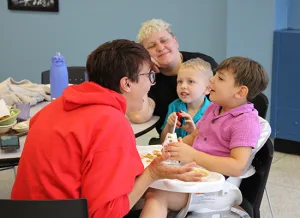
“We’ve been to other events on a smaller scale before that were geared towards families with kids who have hearing loss and felt out of place there because our son also has other disabilities,” Kelly said.
Crystal called the number on the flyer and spoke with Violet Wiker, the Family Liaison for the University of Illinois Chicago’s Division of Specialized Care for Children. Violet helps families enroll in the Institute and addresses any questions or concerns they may have.
Crystal said she talked to Violet for more than two hours.
“She assured me that there were kids of all different learning abilities here, that they would be in a classroom setting… she really sold it to me, really made me feel comfortable,” Crystal said.
She and Kelly then made the trip from Chicago with Casper and his big brother, Courtland. Once they arrived on the School for the Deaf campus, they knew they made the right choice.
“We couldn’t have felt more welcome… We’re used to feeling out of place, so it felt really good to come somewhere and feel normal for once,” Kelly said. “Coming here just felt like going home.”
A total of 22 families from across the state attended this year’s Institute from June 11-16. The Institute is for Illinois parents of children from birth to age 7 who have a significant hearing loss.
Participating parents attend daily lectures by experts in the field to learn about raising a child with hearing loss. Lecture topics include:
- Child development
- Types of hearing loss
- Language development
- Communication choices
- Assistive communication devices
- Deaf culture
- School programming
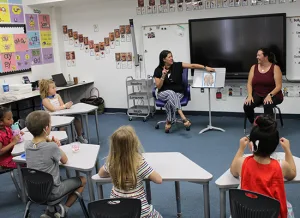
Other activities include meeting in small groups to discuss specific concerns and connecting with other caregivers.
The children with hearing loss attend classrooms based on their age group. Experienced teachers and aides for children who are deaf or hard of hearing oversee these classrooms.
Attending children also can receive hearing, vision, psychological, speech, language and educational evaluations. They also get to play with other children who have a hearing loss.
Siblings also attend the Institute and participate in fun and educational activities, including art projects and learning to sign.
There is no cost for families to participate in the Institute. Meals and housing are provided at no charge.
“One place, all questions answered”
Laura Colic’s son Liam is almost 5 and profoundly deaf. He wears bilateral cochlear implants that he’s had for a little over a year.
“I just wanted to get as much information to make sure that we give him all the opportunities, especially since he’s starting kindergarten in the fall,” Laura said of her decision to attend.
One of her favorite experiences from the week was listening to a panel of Deaf adults share their experiences.
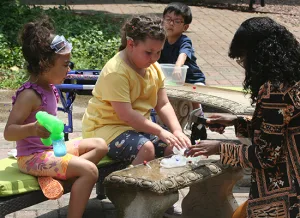
“When you’re in it with little ones, it’s hard to see what that may look like as they grow up. I love the exposure to just the Deaf culture. Even Liam has loved that. He has been so excited to see adults with cochlear implants” she said.
Laura also praised the knowledge of the team of professionals who spoke with families and provided evaluations for the children.
“Their knowledge is phenomenal, and I feel like it’s golden,” she said.
“I wish I could take them with me back home and just create this bubble for Liam. But I’m happy to take the knowledge that they’ve given me, the assessments they’ve provided, the one-to-one time with each of the different people that have worked with Liam and assessed Liam. The evaluations are just phenomenal.”
Sylvia Gavina is mom to 4-year-old Freddy. She appreciated the opportunity to see and understand what Freddy’s hearing loss truly means for him.
“Being able to meet with the professionals and learn what we did in a week takes it to a different level. At home, you might have an appointment one week and then wait three months for the next one. Here, we are leaving with a baseline. One place, all questions answered,” she said.
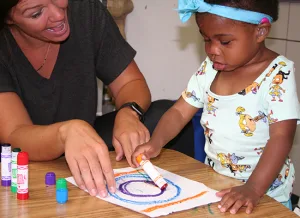
Sheryl Stone’s daughter Nevaeh is 4 ½ and attends the Illinois School for the Deaf. She said the Institute gave her an eye-opening look into how Nevaeh experiences the world. An education session on the Deaf experience helped her understand better what it’s like to not hear and to rely on lip-reading, sign language and other communication methods.
Eddi Fowler said she also learned how to better communicate with her 2 ½-year-old daughter, Kacey. In addition to learning American Sign Language (ASL) and cued speech, Eddi learned more about available resources and how to advocate for Kacey.
“I learned a lot, and I have a lot to take back home with me. I’ve got gigantic paperwork that’s going to help Kacey and my little family throughout the year with her education needs, her hearing loss, her autism, everything,” Eddi said.
“A community of families”
Three-year-old Christian has hearing loss in both of his ears. His parents Basia and Aaron said watching their son become more social with the other children was especially rewarding.
“He’s more expressive. With all the signing and the cued speech that we’re integrating, he’s using his hands more, different modes of communication. That’s something that we were really trying hard to get out of him at home and it’s been tough. But he seemed to really just open up to more people and other children as well,” Aaron said.
Sarah Berns attended the Institute with her son, Colsen, and daughter, Evelyn. Colsen, 7, was born with bilateral sensorineural hearing loss. However, his family was not aware of his hearing loss until he was 3 years old.
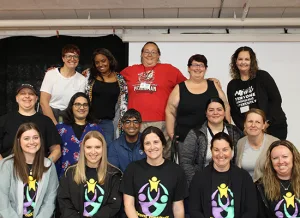
The Institute was the first time he could see other kids with hearing aids and cochlear implants and simply play with them and have fun.
Sarah said she also found a special connection with the other parents.
“I felt like I was all alone. And now I feel like I have a community of families that I can call when I need to talk to them about anything. I also got a lot of information about what my son is going through and what it’s like to be hearing impaired, which is the best connection that I could have with my son, and knowing more about him and what he needs,” she said.
The Institute was also just as valuable for Colsen’s big sister Evelyn.
“She sees that (hearing loss) isn’t something that’s terrible, her brother isn’t annoying, and that there’s this really cool language now that we can have between us that she wasn’t interested in before,” Sarah said. “There’s value in it for her… she has a newfound empathy that she didn’t have before.”
Sarah encourages all families of children with hearing loss to make the trip to the Institute.
“It is life-changing. There are people that value you for who you are, and they are only here to help and give you strategies to help you,” she said.
“A sense of comfort”
After spending a week at the Institute, Kelly and Crystal said they didn’t want to leave.
“We’re not ready to go home. This past week, I’ve felt a sense of comfort that I haven’t felt in a very long time,” Crystal said.
“And that’s saying a lot considering how much information overload has been happening,” Kelly added. “I feel like we should be feeling frazzled and overwhelmed with the amount of new information we’ve gotten, but instead I just feel clarity. I feel clear on where my son’s at, where we need to go, and the options that we have and resources that we have at our disposal.”
Sarah shared a similar sense of peace and optimism for her son, Colsen, after attending the Institute.
“Even though life is not the same plan I thought it was going to be, it’s still going to be wonderful…” she said. “Seeing these other people going through this and through their life, how their life has been impacted by having hearing loss, I realize that (Colsen) really hasn’t lost anything. He is just experiencing it in a different way, and that that’s OK, and that we’re going to be OK.”
Visit our Facebook page to see a photo album with more photos from this year’s program. You can also see videos that highlight different parts of the Institute experience on our YouTube playlist.
The following organizations supported the 2023 Institute:
- University of Illinois Chicago’s Division of Specialized Care for Children (DSCC)
- Department of Human Services – Division of Rehabilitation Services
- Illinois School for the Deaf
- Illinois State Board of Education
- Illinois Department of Public Health
- Ann & Robert H. Lurie Children’s Hospital of Chicago
The 2024 Institute will take place June 13-16. Please see the below flyers for more details:
For more information about the Institute and how DSCC supports children with hearing loss, call (800) 322-3722 or email dsccinstitute@uic.edu.
DSCC Quality Specialist Honored for Service to Families in Crisis
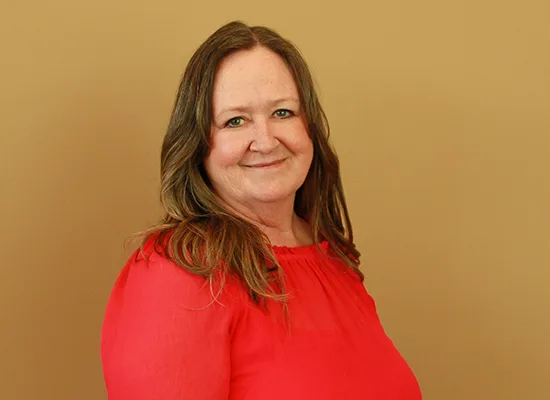
CountyCare awarded Tess Rhodes its Certificate of Excellence for her commitment and dedication
Tess Rhodes is a registered nurse on our Quality Improvement Team. She collaborates with her Division of Specialized Care for Children (DSCC) teammates and partner organizations across Illinois to make sure children in crisis have the right support.
A managed care health plan recently honored Tess for these efforts to protect the safety of children and families.
CountyCare’s Health, Safety and Welfare Team awarded Tess its Certificate of Excellence. The certificate recognizes her “tremendous commitment and dedication” to keeping County Care participants safe and meeting their families’ needs.
Tess said she couldn’t do this important work without DSCC’s care coordination teams and our partners in the community.
DSCC has a contract with CountyCare to provide care coordination to the children and youth with special healthcare needs in its Medicaid managed care health plan.
As a Core/Connect Care Quality Improvement Specialist, Tess helps DSCC’s care coordination teams when a participant enrolled in CountyCare has a critical incident.
Critical incidents are events or situations that create a significant risk of substantial or serious harm to a participant’s physical or mental health, safety or well-being. They can include:
- Abuse or neglect
- Harassment or bullying
- Death of a family member
- Significant injuries
- Medication or treatment errors
- Threat of self-harm
DSCC works with CountyCare to report these incidents and make sure our teams respond to reduce any risks for our participants and help them get the right resources and services they need.
When DSCC team members learn of a critical incident, they must report it to CountyCare within 24 hours of notification.
Tess says it’s important to first ensure that our child/youth is safe and that their family receives the right support for their situation.
Tess and the DSCC care coordination teams work alongside CountyCare staff, the child’s medical team and others to provide access to services and resources.
The DSCC Care Coordinator checks in with the family bi-weekly after a crucial incident to help and monitor the outcome. Tess assists in the process by guiding the participant’s Care Coordinator and providing more resources and materials for education.
Once CountyCare closes a critical incident, Tess continues to monitor the situation and provides final updates at the 30-, 60- and 90-day marks. She also coordinates meetings for all care team members to discuss the incident and develop a plan of support.
“This requires very detailed organizational skills, and Tess never misses an update or chance to help,” her supervisor, Quality Improvement Manager Brandon Bartels, said.
Brandon praised Tess’ “exceptional” communication with CountyCare and her collaboration to keep participants’ and families’ needs at the forefront.
“Tess has received accolades by email from their team multiple times, so this Certificate of Excellence proves not only have they valued her efforts in the past but her continued support for our participants, Care Coordinators, and relationship with CountyCare is truly making an impact,” he said.
Congratulations, Tess! We are grateful for your compassion, teamwork and commitment to children and families!
Share Your Feedback on Illinois’ Plan for Maternal, Child and Family Health

Illinois’ Maternal and Child Health Services Title V Block Grant application is open for public comment until July 21
Illinois families, you have an opportunity to share your input on the state’s latest Maternal and Child Health (MCH) Services Title V Block Grant application and report.
The MCH Title V Block Grant is a federal and state partnership to improve the health and well-being of all mothers, infants and children. The block grant is authorized by Title V of the Social Security Act.
Every state receives MCH Title V Block Grant funds. At least 30 percent of these funds must support services for children and youth with special healthcare needs.
The Division of Specialized Care for Children (DSCC) has managed Illinois’ Title V program for children and youth with special healthcare needs since 1937.
Each year, states must complete an application for future funding and an annual report of our MCH activities from the last federal fiscal year. DSCC has partnered with the Illinois Department of Public Health (IDPH) to help with Illinois’ latest application.
The 2024 MCH Title V Block Grant Application and 2022 Annual Report are posted on the IDPH website. You can also see Illinois’ updated MCH Title V Block Grant Action Plan for 2021-25, which includes the Title V priorities, national performance measures and strategies.
You can share your comments or recommendations on these documents until noon on July 21.
Please send comments to Title V Coordinator Cassidy Chambers at Cassidy.Chambers@illinois.gov.
More details are on the IDPH website.
For more information about DSCC’s Title V role, check out our Fiscal Year 2022 Annual Report.
Project Fire Buddies Helps DSCC Participant Attend Concert of Her Dreams
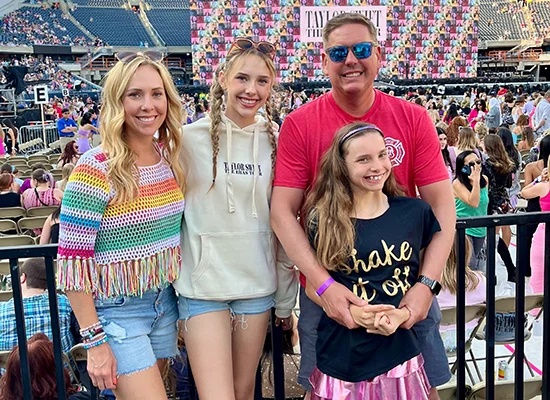
Lily Brown and her entire family saw Taylor Swift perform at Chicago’s Soldier Field
Lily Brown and her family experienced a whirlwind week earlier this month that they won’t soon forget.
The 14-year-old Oak Forest girl graduated from eighth grade. She then played in an adaptive Little League Challenger baseball game.
But the week’s biggest highlight was seeing Lily’s favorite artist Taylor Swift in concert at Soldier Field in Chicago on June 2.
“It was a very special week for all of us,” Lily’s mom, Jennifer Brown, said.
A nonprofit group of Chicago-area firefighters called Project Fire Buddies made the unforgettable concert experience possible.
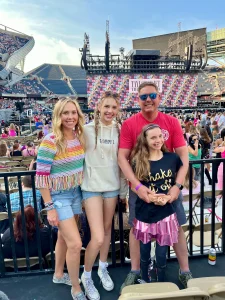
Lily has Rett syndrome, a rare genetic neurological disorder. The condition can severely affect abilities such as speaking, walking, eating and even breathing.
Lily has seizures and uses a wheelchair. Even though she doesn’t speak, she says a lot through her expressive eyes and huge smile.
She is also a participant with the University of Illinois Chicago’s Division of Specialized Care for Children (DSCC). DSCC partners with families to help them find the right services and resources for their child’s special healthcare needs.
In January, Lily turned 14. For her birthday present, Jennifer wanted to take her to see Taylor Swift, who announced her concert tour would include Chicago.
“I took her older sister, Grace, when she was about 9 years old to see Taylor Swift. It was a really special mother and daughter experience,” Jennifer explained. “I wanted Lily and I to have that same experience. Due to the pandemic, Taylor Swift hasn’t toured for a while.”
From the day the tour was announced, they searched for two accessible tickets nearly every day. But their search came up empty. Then, the Oak Forest Project Fire Buddies heard about Lily’s wish to see Taylor Swift.
The Oak Forest Fire Department created Project Fire Buddies in 2016. Its mission is to bring joy to kids struggling with serious illnesses and their families. Volunteers visit the kids throughout the year to deliver gifts for special occasions, play games, read books or just to say “hi” and spend time together.
“We love the fire buddies!” Jennifer said. “We’re so grateful for all that they do. They gave Lily a bike made specifically for her needs so that she can enjoy riding. This year, she’s also playing with the Challenger’s baseball team and enjoyed playing against the Project Fire Buddies team.”
Now, Project Fire Buddies has made Lily’s ultimate birthday wish come true and more.
“Our family usually has to use the divide and conquer approach. We don’t get to attend events together very often,” Jennifer said. “It was an incredible surprise to learn that our Oak Forest Fire Buddies chapter found tickets for our entire family and worked with Soldier Field to have the area accessible for Lily’s wheelchair. We were just blown away.”
Since no “Swifty” can go to a concert without bling, everyone made sure Lily had just what she needed for the big night.
“We made a cute ‘Shake it Off’ shirt with all the sparkle and bling any Swifty would be proud of,” Jennifer said. “We also made a sign, and friends also got her some flashy, light-up flare.”
The Brown’s had an amazing time – together – at the Taylor Swift concert.
“The show was incredible, and Lily loved it,” Jennifer said. “She did have a couple of seizures during the show but bounced back in time to catch her favorite song, ‘Shake it Off.’”
“Project Fire Buddies is hoping to expand to help more kids who are medically challenged or have life-threatening conditions,” Jennifer added. “The Oak Forest chapter is amazing and incredibly generous. They are an important part of Lily’s life, and we are so thankful.”
Visit our Resource Directory to learn more about Project Fire Buddies.
You can also read about the news coverage of Lily’s special concert experience:
Thank you to Project Fire Buddies for making Lily’s wish come true!



